Residents at Tufts have a number of unique ways to enhance their education based on their educational and career goals. Residents can elect to join a Track in their PGY-2 or PGY-3 year. Tracks allow residents to gain extra skills and obtain additional mentorship in a research or scholarly project in the content area of the track. The program is committed to developing additional tracks based on resident interest.
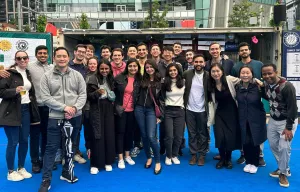
This unique track is designed for residents who are interested in pursuing a career in academic medicine as a clinician educator. Participants get a focused three weeks of didactics, workshops, and observation/teaching sessions on foundational concepts and theories in education during the first block of their second and third year of residency. Each participant is also paired with a primary mentor with experience in teaching and medical education scholarship who they work closely with on a scholarly medical education project.
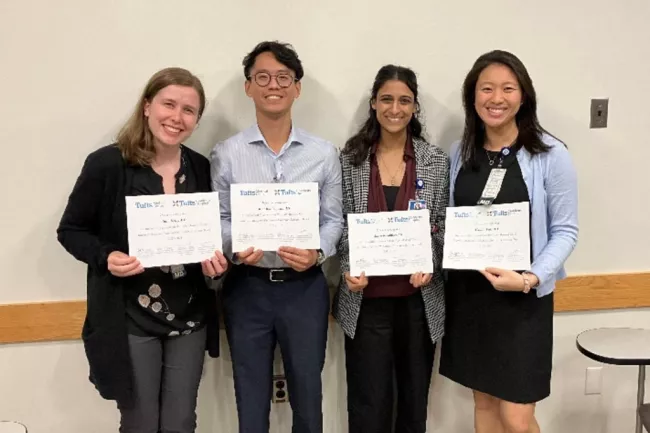
Clinician Educator Track Goals
- Developing your skills as a scholar in the field of medical education research
- Increasing exposure to leadership and mentorship in medical education
- Developing your portfolio for a career as a clinician educator
- Improving your teaching skills
Sample Summer Block Educational Sessions:
- Learning Climate and Control of Teaching Session
- Evaluation, Feedback, and Self-Directed Learning
- Approach to a Struggling Learner
- Adult Learning Theory
- Technology in Medical Education
- How to give a Chalk Talk
- Peer Observation of Teaching
- Small Group Teaching
- Active Learning
- Survey Design
- Qualitative Research Methodology
- Curriculum Development
- Giving Feedback
- Career Development as a Medical Educator
- Disparities in Medical Education
- Leadership in Medical Education
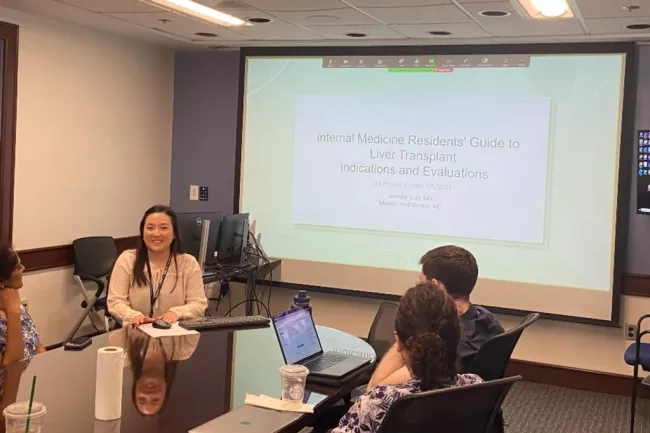
Current Ongoing Resident Scholarly Projects:
- Development of Informed Consent Curriculum for Residents
- Evaluation of Feedback Culture (Poster presentation at the SGIM Conference in Colorado in 2023)
- Development of Ambulatory Palliative Care Curriculum
- Evaluation of Code Status and Resident Decision Making
- Development of Liver Transplant Workshops and Handbook
- Development of Rapid Response Simulation for Interns
Past Resident Scholarly Projects:
Development of IM resources:
- Congestive Heart Failure Management Handbook (specifically for the CHF service at Tufts MC)
Development of Curricula:
- Pharmacologic Weight Management for Resident Primary Care Clinic
- Structured Didactics for Resident ICU Education
- Addiction Medicine Curriculum for Medical Residents
- Intern Wellness and Resiliency Curriculum
- Point-of-care Ultrasound Curriculum for Internal Medicine Residents
- Goals of Care Discussions with Non-English Speaking Chinese Patients (Poster presentation at the World Research Congress of the European Association for Palliative Care, 2022)
- Interactive Curriculum for IM interns to Prepare for Inpatient Wards (Oral presentation at New England Chapter of SGIM, 2019)
- Interactive Text-Message Based Curriculum for Board Review (Poster presentation at the annual SGIM meeting in Birmingham AL, 2020)
Workshops:
- Interactive Musculoskeletal Shoulder Exam for residents
- Managing Inflight Medical Emergencies (Poster presentation at the annual SGIM meeting in Washington DC, 2019)
- Physician Advocacy for Third Year Medical Students
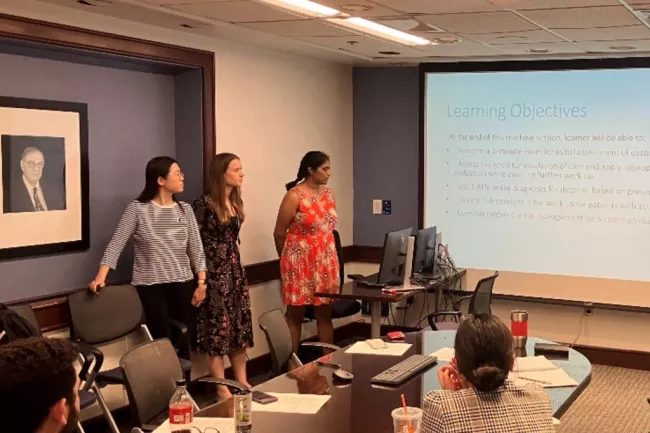
For more information, please contact Dr. Taimur Dad or Dr. Natasha Pradhan
The Ambulatory Track is open to any rising second- or third-year resident interested in increasing their experience and training in primary care or other outpatient subspecialties.
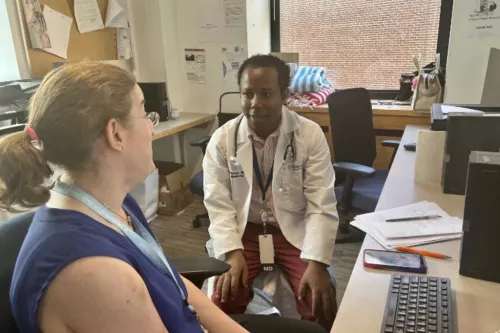
Curriculum
- A 3-week primary care or subspecialty ambulatory elective scheduled during second and third year beyond the core primary care clinic blocks.
- For residents interested in primary care, they are able to rotate through subspecialty clinics that are valuable for primary care training including:
- Dermatology
- Orthopedics
- Physical Therapy
- Diabetes clinic
- Pharmacy clinic
- Physical Medicine and Rehabilitation
- For residents interested in ambulatory subspecialty clinics, they are offered
- 3 subspecialty clinics during each core primary care block
- 6 subspecialty clinics during each 3 week ambulatory block
- A 3-week rotation in our Quincy satellite practice to gain experience in a community setting
- Additional Primary Care CME Conferences
Mentorship
All residents applying to primary care positions after residency will have dedicated career mentorship and advice on the job application process with several events planned throughout the year including:
- A career panelist dinner
- Guidance in creating a CV and cover letter
- Tips for interviewing
- Guidance with contracts negotiations
Tufts Internal Medicine Research Track
Mission/Purpose: The research track is a curriculum aimed toward residents with an interest in research. The track will equip residents with the skills to conduct research in residency and pursue a career in academic research. They will form a community to help foster and support each other's individual research agendas.
Participants: 4-5 residents / class. Participation in the program will be by application only and residents will apply in January of their intern year. This program is geared towards residents who anticipate research being a core part of their careers.
Track Duration: January Intern Year – June R3 Year (For first year, 2023, track will start in April)
Track Features:
Longitudinal Research Support: Residents will participate in bi-monthly (every other month) hour long research progress meetings, during which ~2 residents will be required to provide track participants with a 20-minute research update. Participants will be expected to present 2x/year. Additionally, there will be 10-minute stand-ups at the end of each progress meeting and professional development session during which residents will spend 30 seconds providing the group with a brief update on their research.
Longitudinal Professional Development: Residents will participate in bi-monthly hour-long professional development didactic sessions. These sessions will alternate with the bi-monthly research progress updates.
Biostatistics/Informatics Bootcamp: R2/R3 residents will participate in a one-week bootcamp at the beginning of the academic year. Classes will be focused on biostatistics and informatics and will be held in half-day sessions to allow time for independent research.
Protected Research Time: Participants will be given 4 weeks of dedicated research time (including bootcamp) in R2/R3 years, along with one afternoon per month of protected research time during ambulatory and non-research elective blocks.
Track Requirements:
- Participants will be required to submit their work in written or poster format before completing residency.
- Participants will be required to attend 80% of sessions, with exceptions made for scheduling conflicts such as night float, vacation, etc.
Committees and Leadership
There are also a variety of residency program, GME, and hospital-wide committees residents can join in order to get involved in the community at Tufts, to shape the environment, and to make a difference. The committees also provide residents with leadership opportunities tailored towards their interest and career goals. We always welcome new resident lead committees based on their interests. A few examples:
IM Program committees:
- House staff committee
- Wellness committee
- IM Simulation committee
- Program Evaluation committee
- Resident Research Committee
- Resident Recruitment Committee
- Women in Medicine Committee
GME committees for residents:
- Diversity, Equity, and Inclusion subcommittee
- Graduate Medical Education committee
- Accreditation subcommittee
- Resident Leadership Council
Hospital-wide committees with residents:
- Central-line associated bloodstream infection committee (CLABSI)
- Women in Medicine and Science committee